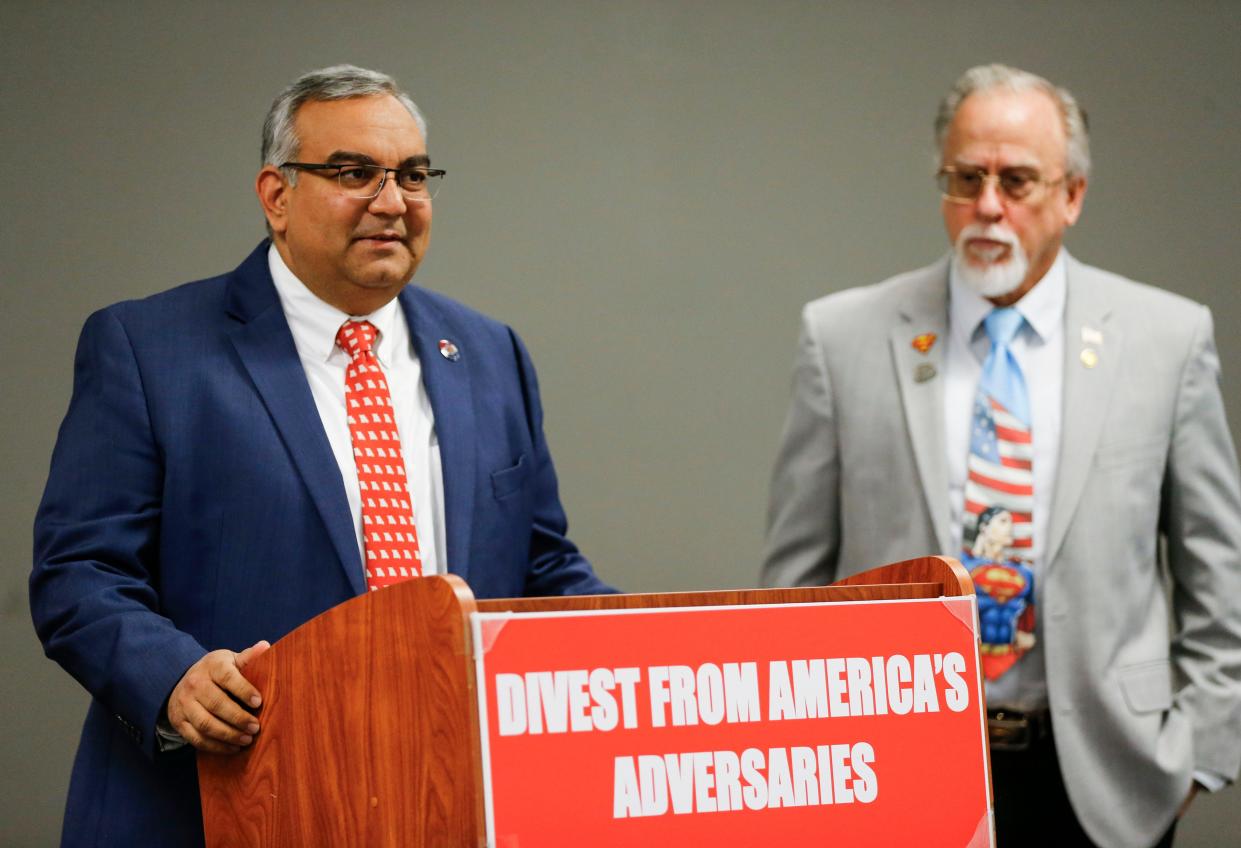A Branson lawmaker wants Missouri to stop investing in China. State treasurer agrees

Editor's note: A previous version of this article quoted Missouri State Treasurer Vivek Malek as saying the Missouri State Employee Retirement System had about $2 million invested in China. MOSERS has about $200 million invested in China.
Missouri State Treasurer Vivek Malek has publicly given his support to a bill filed by Branson Rep. Brian Seitz that would require state investments, like pensions and public endowments, to divest from countries that the U.S. has sanctioned or has classified as adversaries. Malek and Seitz spoke Thursday afternoon at the Greene County Elections Center in Springfield.
House Bill 2143, which has not yet had a public hearing, would allow two years for institutions to get rid of investments in China, Russia, Iran, Korea, Cuba, Venezuela and Syria, as well as any other "entity designated by the governor in consultation with the attorney general," the bill reads. Malek noted that the bill gives deference to current federal classifications of adversarial nations.
"The Foreign Adversary Divestment Act is pivotal to protecting Missouri public investment dollars by ensuring they are not put at risk in countries that are adversarial to our state or nation," Seitz said. "Missourians don't want dollars being invested in China. They don't want them going to the Democratic People's Republic of Korea. They don't want them going to the Russian Federation and then used to impede the goals of our state and our nation."
More: Missouri legislators will try again to restrict foreign farmland ownership next session
Seitz cited national security as well as fiscal reasons for what he called a bipartisan, commonsense bill.
"These are bad investments with increasingly poor returns, and the citizens whose money is being put at risk deserve better," Seitz said.
In Missouri, there are 129 public pension funds, as well as 13 public higher education institutions with investment funds. Malek noted that it may not be immediately obvious which funds have foreign adversary investments but that the bill would require review of investments. To figure out what investments may be relevant, the treasurer's office will compile a list with the help of the Office of Foreign Asset Control and the Department of State.
According to Malek, the Missouri State Employee Retirement System has about $200 million invested in China.
Malek has championed the Missouri State Employee Retirement System's divestment from China. The MOSERS board, after rejecting Malek's efforts in November, voted to sell most of its investments in Chinese companies, according to Missouri Independent reporting. Malek said that people with existing pensions would not see negative impacts on their benefits if the organization disbursing them is required to divest.
More: Missouri’s lawsuit against China to proceed on grounds that it hoarded PPE during COVID-19
"As far as the returns on investment are concerned, over the past 15 years, what I have seen on the MOSERS board, the investments in emerging markets without China have performed better than investments in emerging markets with China," Malek said.
Other states have enacted similar divestment measures such as Tennessee and Indiana, while the governors of other states like South Dakota, Texas, Mississippi and Iowa have asked for "more emerging market funds without exposure to adversary nations."
In August, President Joe Biden signed an executive order that blocks and regulates some of the high-tech U.S. investments going toward China.
This article originally appeared on Springfield News-Leader: Treasurer backs bill requiring public pensions to divest from China

